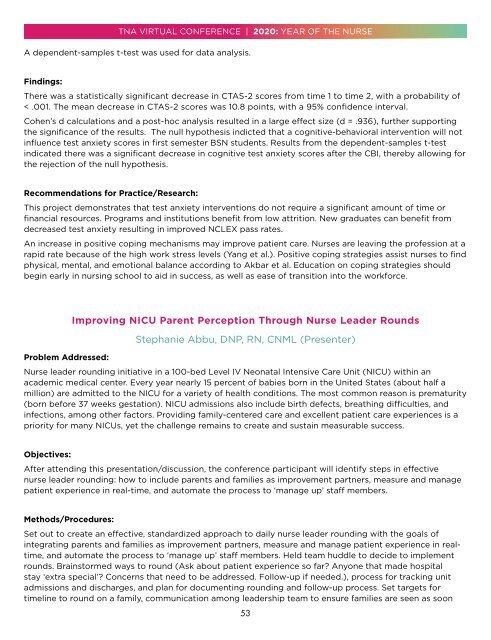Tennessee Yearbook 2020
You also want an ePaper? Increase the reach of your titles
YUMPU automatically turns print PDFs into web optimized ePapers that Google loves.
TNA VIRTUAL CONFERENCE | <strong>2020</strong>: YEAR OF THE NURSE<br />
A dependent-samples t-test was used for data analysis.<br />
Findings:<br />
There was a statistically significant decrease in CTAS-2 scores from time 1 to time 2, with a probability of<br />
< .001. The mean decrease in CTAS-2 scores was 10.8 points, with a 95% confidence interval.<br />
Cohen’s d calculations and a post-hoc analysis resulted in a large effect size (d = .936), further supporting<br />
the significance of the results. The null hypothesis indicted that a cognitive-behavioral intervention will not<br />
influence test anxiety scores in first semester BSN students. Results from the dependent-samples t-test<br />
indicated there was a significant decrease in cognitive test anxiety scores after the CBI, thereby allowing for<br />
the rejection of the null hypothesis.<br />
Recommendations for Practice/Research:<br />
This project demonstrates that test anxiety interventions do not require a significant amount of time or<br />
financial resources. Programs and institutions benefit from low attrition. New graduates can benefit from<br />
decreased test anxiety resulting in improved NCLEX pass rates.<br />
An increase in positive coping mechanisms may improve patient care. Nurses are leaving the profession at a<br />
rapid rate because of the high work stress levels (Yang et al.). Positive coping strategies assist nurses to find<br />
physical, mental, and emotional balance according to Akbar et al. Education on coping strategies should<br />
begin early in nursing school to aid in success, as well as ease of transition into the workforce.<br />
Problem Addressed:<br />
Improving NICU Parent Perception Through Nurse Leader Rounds<br />
Stephanie Abbu, DNP, RN, CNML (Presenter)<br />
Nurse leader rounding initiative in a 100-bed Level IV Neonatal Intensive Care Unit (NICU) within an<br />
academic medical center. Every year nearly 15 percent of babies born in the United States (about half a<br />
million) are admitted to the NICU for a variety of health conditions. The most common reason is prematurity<br />
(born before 37 weeks gestation). NICU admissions also include birth defects, breathing difficulties, and<br />
infections, among other factors. Providing family-centered care and excellent patient care experiences is a<br />
priority for many NICUs, yet the challenge remains to create and sustain measurable success.<br />
Objectives:<br />
After attending this presentation/discussion, the conference participant will identify steps in effective<br />
nurse leader rounding: how to include parents and families as improvement partners, measure and manage<br />
patient experience in real-time, and automate the process to ‘manage up’ staff members.<br />
Methods/Procedures:<br />
Set out to create an effective, standardized approach to daily nurse leader rounding with the goals of<br />
integrating parents and families as improvement partners, measure and manage patient experience in realtime,<br />
and automate the process to ‘manage up’ staff members. Held team huddle to decide to implement<br />
rounds. Brainstormed ways to round (Ask about patient experience so far? Anyone that made hospital<br />
stay ‘extra special’? Concerns that need to be addressed. Follow-up if needed.), process for tracking unit<br />
admissions and discharges, and plan for documenting rounding and follow-up process. Set targets for<br />
timeline to round on a family, communication among leadership team to ensure families are seen as soon<br />
53

















